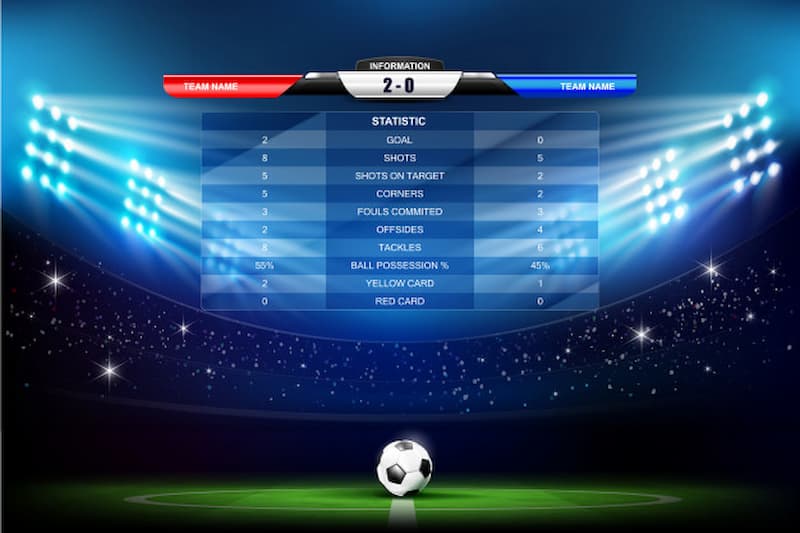Xem tỷ số bóng đá trực tuyến chưa bao giờ dễ dàng đến như vậy. Khi bạn chỉ cần truy cập vào Tỷ Số Bóng Đá là có thể biết được kết quả toàn bộ các trận đấu vừa mới diễn ra. Bởi chúng tôi đang cập nhật tsbd cho toàn bộ các giải đấu với thông tin đầy đủ nhất.
Cập nhật tỷ số bóng đá nhanh nhất
Tỷ số bóng đá chắc hẳn là một trong những website bóng đá trực tuyến hàng đầu Việt Nam hiện nay. Khi mà chúng tôi đã xuất hiện trên thị trường từ khá lâu. Cho nên đã xây dựng được cho mình một thưởng hiệu khá uy tín và chất lượng.

Trong những năm gần đây, với việc đầu tư khá là bài bản đã trở thành một địa điểm được khá nhiều anh em yêu thích bóng đá lựa chọn. Mỗi khi muốn tìm và xem bất kỳ thông tin nào về bóng đá ngay trên máy tính hay điện thoại của mình. Bởi chúng tôi đang cập nhật toàn bộ các thông tin bổ ích sau:
- Những tin tức, sự kiện về bóng đá hot nhất, mới nhất mỗi ngày ở toàn bộ các giải đấu trên toàn thế giới. Tin tức bóng đá mà chúng tôi cập nhật cũng khá đa dạng, từ tin về giải đấu, trước trận đấu, huấn luyện viên, cầu thủ, chuyển nhượng,…
- Tỷ số Bóng Đá cho toàn bộ các trận đấu diễn ra ở bất kỳ giải đấu nào. Thời gian cập nhật cũng khá nhanh và thông tin cũng đầy đủ
- Video highlight của các trận đấu lớn vừa mới kết thúc với nội dung đầy đủ và chất lượng cũng khá cao
- Lịch thi đấu bóng đá mỗi ngày cho toàn bộ các giải đấu, giúp bạn biết hôm nay diễn ra các trận đấu nào, thời gian ra sao
- Bảng xếp hạng các giải bóng đá được yêu thích tại Việt Nam hiện nay, giúp bạn nắm được thành tích của bất kỳ đội bóng nào
- Cung cấp ứng dụng Livescore giúp bạn có thể xem tỷ số trực tiếp khi các trận đấu bóng đá đang diễn ra
- Bảng kèo nhà cái của toàn bộ các trận đấu diễn ra trong ngày cũng đượccập nhật từ khá sớm. Trong bảng kèo sẽ đầy đủ các thông tin và chuẩn xác 100% , giúp bạn có thể soi kèo một cách chuẩn nhất
- Chúng tôi còn cập nhật cho bạn biết những bài dự đoán, soi kèo của những chuyên gia bóng đá hàng đầu, giúp bạn đưa ra những quyết định cá cược chính xác hơn
- Tại đây, bạn còn được tham khảo những tips bóng đá của những cao thủ hàng đầu. Để bạn có thể tăng tỷ lệ thắng khi cá cược bóng đá.
Trong những thông tin được chúng tôi cập nhật trên đây thì kết quả bóng đá trực tuyến được rất nhiều người xem mỗi ngày. Chính vì thế, nếu bạn đang cần biết bất kỳ trận đấu nào, đây là website nên truy cập vào ngay.
Tỷ Số Bóng Đá– Trang web cập nhật tỷ số Bóng Đá trực tuyến hàng đầu
Khi mà công nghệ phát triển thì việc xem tỷ số trở nên cực kỳ đơn giản. Khi bạn không cần phải chờ các bản tin thể thao trên TV hay mua báo giấy để xem kết quả trận đấu mình muốn nữa. Thay vào đó, bạn chỉ cần truy cập vào tỷ số bóng đá trực tuyến là có thể biết được kết quả bất kỳ trận đấu nào với thông tin đầy đủ và chuẩn xác nhất.
Hiện tại chúng tôi đang xây dựng một chuyên mục Tỷ Số cực kỳ bài bản và chuyên nghiệp. Mà khi xem tỷ số bóng đá tại tỷ số bóng đá hôm nay, bạn sẽ nhận được những lợi ích sau:
Xem tỷ số Bóng Đá đầy đủ
Chỉ cần truy cập vào website Tỷ Số Bóng Đá, bạn sẽ biết được kết quả của toàn bộ các trận đấu vừa mới diễn ra cực kỳ đơn giản. Bởi chúng tôi đang cập nhật kết quả bóng đá hôm nay cho tất cả các giải bóng đá hàng đầu sau:
- Giải đấu Ngoại Hạng Anh
- Giải đấu Champion League
- Giải đấu Europa League
- Giải đấu Serie A
- Giải đấu La Liga
- Giải đấu Bundesliga
- Giải đấu League 1
- Giải đấu World Cup
- Giải đấu Euro
- Giải đấu Copa America
- Giải đấu Việt Nam
- Giải đấu V-League
- Ngoài ra còn có rất nhiều giải đấu khác trên toàn thế giới.
Xem Tỷ Số Bóng Đá nhanh và đầy đủ thông tin
Để xây dựng chuyên mục Tỷ Số Bóng Đá Trực Tuyến chuyên nghiệp nhất, chúng tôi đã thuê rất nhiều biên tập viên hàng đầu. Để tiến hành cập nhật kqbd trực tuyến 24/24, cho nên ngay khi trận đấu vừa kết thúc là bạn sẽ biết kết quả ngay.

Thêm vào đó, khi xem kết quả trực tuyến tại đây, bạn sẽ nắm được toàn bộ các thông tin quan trọng như:
- Tỷ số cuối cùng của trận đấu
- Cầu thủ ghi bàn, kiến tạo
- Số lần phạt góc, ném biên
- Số thẻ vàng, thẻ đỏ
- Thời lượng kiểm soát bóng
Tỷ Số Bóng Đá Hôm nay cũng cam kết rằng những thông tin mà trong tôi cập nhật trong kết quả cũng chuẩn xác tuyệt đối. Cho nên bạn hoàn toàn có thể yên tâm khi sử dụng hoặc là tham khảo.
Xem Tỷ số Bóng Đá bằng Livescore
Tại tỷ số bóng đá hiện tại còn có ứng dụng Livescore cực kỳ hữu ích. Mà bạn có thể sử dụng để xem kết quả trận đấu bóng đá mà mình thích một cách nhanh nhất. Bởi với Livescore, tất cả kết quả các trận đấu đều được cập nhật với thông tin chi tiết.
Thêm vào đó, bạn còn có thể xem kết quả của nhiều trận đấu cùng 1 lúc khá là dễ dàng. Điều này cực kỳ hữu ích cho những anh em muốn biết tỷ số của 1 giải đấu hay các đội bóng hàng đầu. Đương nhiên thông tin cũng được sắp xếp cực kỳ khoa học. Mà chỉ cần nhìn vào là bạn có thể tìm được thông tin mình cần.
Ngoài ra với ứng dụng Livescore của chúng tôi, bạn còn có thể xem được tỷ số trực tiếp những trận đấu đang diễn ra cực kỳ nhanh chóng. Giúp bạn không cần phải tốn thời gian xem trực tiếp trận đấu, nhưng vẫn biết được kết quả như thế nào.
Xem Tỷ Số Bóng Đá với video highlight

Đối với những anh em không xem trực tiếp được trận đấu bóng đá mà mình yêu thích. Ngoài việc muốn xem lại kết quả bóng đá hôm nay như thế nào. Thì còn muốn xem lại video highlight của trận đấu, để biết những diễn biến chính.
Biết được điều này, Tỷ Số Bóng Đá Trực Tuyến cũng cập nhật highlight cho toàn bộ các trận đấu lớn vừa mới diễn ra. Cho nên bạn dễ dàng tìm và xem lại được video highlight trong trận đấu mà mình muốn dễ dàng. Trong video, bạn sẽ thấy toàn bộ những diễn biến chính của trận đấu đều có đầy đủ.
Chất lượng của video highlight được Tỷ Số Bóng Đá cập nhật cũng khá là cao, khi từ hình ảnh, âm thanh đều tốt. Đặc biệt, bình luận cũng hoàn toàn bằng tiếng Việt từ các BLV hàng đầu, càng làm trải nghiệm xem của bạn trở nên tốt hơn.
Xem Tỷ Số Bóng Đá với bình luận sau trận đấu

Để bạn có thể nắm được toàn bộ những thông tin quan trọng khi trận đấu kết thúc. Cũng như biết các cầu thủ của hai đội thi đấu như thế nào, điểm số được chuyên gia chấm ra sao,… Tỷ Số Bóng Đá trực tuyến còn cập nhật cả bình luận sau trận đấu của những chuyên gia hàng đầu cho bạn tham khảo.
Đối với những bài bình luận này, bạn sẽ biết các chuyên gia đánh giá trận đấu như thế nào, hai đội thi đấu ra sao, các cầu thủ được bao nhiêu điểm,… Đương nhiên chúng tôi cũng chỉ lấy từ các chuyên gia có uy tín, nên bạn có thể hoàn toàn yên tâm khi tin tưởng.
Hướng dẫn cách xem Tỷ Số Bóng Đá
Một lợi ích nữa mà bạn nhận được khi xem kết quả bóng đá trực tuyến tại đây. Đó chính là giao diện của Tỷ Số Bóng Đá được thiết kế cực kỳ thông minh. Cho nên để tìm và xem tỷ số bất kỳ trận đấu nào tại đây, bạn chỉ cần làm như sau:
- Bước 1: Bạn sẽ sử dụng máy tính, laptop hoặc là điện thoại được kết nối mạng rồi truy cập vào trang web Tỷ Số Bóng Đá
- Bước 2: Tiếp theo bạn sẽ vào mục Tỷ Số ngay trên thanh Công Cụ ở đầu trang web
- Bước 3: Tại đây, bạn sẽ dựa vào tên đội bóng, giải đấu hay là thời gian mà trận đấu diễn ra để tìm kết quả trận đấu mà mình muốn.
Tương tự như vậy, nếu bạn muốn xem video highlight bất kỳ trận đấu nào mới diễn ra tại trang web Tỷ Số Bóng Đá. Bạn cũng chỉ cần truy cập vào mục Highlight rồi nhấn vào video mà mình muốn xem là xong.
Có nên xem Tỷ số Bóng Đá trực tuyến tại ỷ Số Bóng Đá hay không?
Với tất cả những gì mà chúng tôi chia sẻ với bạn trên đây. Có thể khẳng định rằng Tỷ Số Bóng Đá chính là website mà bạn nên truy cập vào ngay lập tức. Nếu như muốn xem kết quả bóng đá trực tuyến bất kỳ trận đấu nào. Bởi Tỷ Số Bóng Đá có những ưu điểm sau đây:

- Chúng tôi hoạt động dưới hình thức phi lợi nhuận, cho nên bạn có thể tìm và xem kqbd hoàn toàn miễn phí
- Tỷ Số Bóng Đá cũng đang cập nhật kết quả cho toàn bộ các giải đấu trên thế giới, từ các giải bóng đá lớn tại Châu Âu cho đến các giải nhỏ trong nước và khu vực. Cho nên chỉ cần vào đây, bạn có thể dễ dàng tìm và xem được kết quả trận đấu mình muốn
- Thời gian mà Tỷ Số Bóng Đá cập nhật kqbd trực tuyến cũng khá là sớm, giúp bạn biết được ngay khi trận đấu vừa mới kết thúc
- Khi xem kết quả bóng đá hôm nay tại đây, bạn cũng nắm được toàn bộ các thông tin quan trọng, từ tỷ số, thời lượng kiểm soát bóng, cầu thủ ghi bàn, số lần phạt góc, ném biên,…
- Thêm vào đó, chúng tôi còn cập nhật cả video highlight cho các trận đấu lớn. Để bạn xem lại được những diễn biến chính của trận đấu với chất lượng cao nhất
- Tại đây, bạn còn có thể sử dụng Livescore để xem kết quả của nhiều trận đấu bóng đá cùng 1 lúc. Giúp bạn biết toàn bộ kết quả của giải đấu mà mình yêu thích mới vừa diễn ra
- Giao diện của Tỷ Số Bóng Đá cũng được thiết kế cực kỳ đơn giản mà gần như ai cũng có thể sử dụng dễ dàng. Giúp bạn tìm và xem được kết quả trận đấu mình muốn nhanh nhất
- Ngoài ra giao diện của chúng tôi còn có thể tương thích với nhiều thiết bị khác nhau, nên bạn có thể xem tỷ số tại đây bằng máy tính, điện thoại hoặc là laptop dễ dàng.
Tỷ Số Bóng Đá cập nhật kết quả bóng đá trực tuyến của các giải bóng đá hàng đầu thế giới
Khi truy cập vào Tỷ Số Bóng Đá để xem Tỷ Số Bóng Đá trực tuyến, bạn sẽ biết được tỷ số của toàn bộ các giải đấu hàng đầu thế giới hiện nay. Trong đó những giải đấu được tìm và xem ket qua bong da nhiều nhất tại đây phải kể đến như:
Tỷ số bóng đá Ngoại hạng Anh – Premier League
Ngoại Hạng Anh chính là giải đấu được yêu thích nhất trong nước hiện nay. Khi tại đây có các đội bóng hàng đầu thế giới thi đấu mỗi tuần để giành chức vô địch. Đặc biệt, tính cạnh tranh của giải đấu Ngoại Hạng Anh cực kỳ khốc liệt, cho nên đa số mọi người đều rất thích. Tuy nhiên vì thời gian thi đấu khá muộn, cho nên không phải ai cũng xem trực tiếp được.
Tỷ số bóng đá Champion League
Champion League hiện tại đang là giải đấu quy tụ được nhiều CLB bóng đá hàng đầu thế giới. Khi toàn bộ những đội bóng mạnh nhất Châu Âu đều thi đấu ở giải này. Đương nhiên, chức vô địch Champion League cực kỳ danh giá, cho nên các đội thường cạnh tranh khá khốc liệt nếu muốn vô địch. Điều này làm cho các trận đấu tại Cúp C1 trở nên cực kỳ hấp dẫn, nhất là ở vòng đối đầu trực tiếp. Chính vì thế, Tỷ số bóng đá cũng cập nhật TSBD Champion League khá chi tiết. Cho những người không thể xem được các trận đấu của giải này có thể xem lại dễ dàng.
Tỷ số bóng đá La Liga

La Liga cũng là một trong các giải bóng đá hàng đầu thế giới và khá được yêu thích tại Việt Nam. Khi tại đây có rất nhiều đội bóng tên tuổi, trong đó đó phải kể đến 2 CLB là Real Madrid và Barca. Chính vì thế, các trận đấu tại La Liga cũng thu hút khá nhiều người theo dõi. Tuy nhiên không phải ai cũng có điều kiện để xem trực tuyến.
Mà đa số mọi người đều xem lại kết quả vào ngày hôm sau, bởi thời gian thi đấu khá trễ. Đương nhiên, tỷ số bóng đá hôm nay chính là địa chỉ được lựa chọn để xem ket qua bong da La Liga nhiều nhất. Bởi chúng tôi cập nhật kết quả của tất cả các trận đấu tại giải này cực kỳ chuẩn và nhanh.
Tỷ số bóng đá Serie A
Đối với những người yêu bóng đá thì chắc không lạ gì với giải bóng đá Serie A. Khi đây là một trong các giải đấu có truyền thống lâu đời nhất trên thế giới. Cũng như mỗi tuần đều diễn ra các trận đấu hấp dẫn giữa những đội bóng hàng đầu như AC Milan, Juventus, Inter Milan, AS Roma, Napoli,… Cũng như các giải bóng đá khác tại Châu Âu, thời gian thi đấu của Serie A khá trễ. Chính vì thế, mọi người cũng thường truy cập vào Tỷ số bóng đá để xem lại TSBD Serie A nhanh nhất.
Tỷ số bóng đá Bundesliga
Tại Việt Nam thì Bundesliga cũng là một giải bóng đá được khá nhiều người quan tâm. Tuy nhiên do không có thời gian xem trực tiếp mà nhiều người chọn cách xem lại kết quả. Đương nhiên Tỷ số bóng đá cũng là địa chỉ được tìm đến nhiều nhất. Bởi chúng tôi cập nhật TSBD Bundesliga cực kỳ đầy đủ, chuẩn xác cho toàn bộ các trận đấu.
Tỷ số bóng đá Ligue 1
Hiện tại Ligue 1 đang nổi lên như một giải bóng đá hàng đầu. Khi vung tiền chiêu mộ những cầu thủ hàng đầu thế giới như Messi, Neymar, Ramos,.. Điều này làm cho chất lượng giải đấu tăng lên khá nhiều. Tuy nhiên, đa số mọi người thường chỉ xem lại kết quả các trận đấu tại giải này. Trang web được nhiều người truy cập nhất cũng chính là Tỷ số bóng đá. Khi chỉ cần vào đây, mọi người có thể tìm và xem kết quả cho bất kỳ trận đấu nào.
Tỷ số bóng đá World Cup, Euro, Copa America
World Cup, Euro hay Copa America là 3 giải bóng đá cấp đội tuyển quốc gia hàng đầu thế giới hiện nay. Thêm vào đó thời gian tổ chức cũng khá lâu, khi thường 4 năm mới diễn ra 1 lần. Cho nên sức hút của những giải bóng đá này cực kỳ lớn.
Tuy nhiên tại những giải bóng đá này có các trận đấu diễn ra cùng giờ với nhau. Cho nên không thể cùng 1 lúc xem được toàn bộ. Chính vì thế, để biết kết quả của những trận đấu bóng đá mà mình không thể xem được. Mọi người thường chọn Tỷ số bóng đá để xem ket qua bong da trực tuyến.
Tỷ số bóng đá V-League
V-League là giải bóng đá quốc nội lớn nhất Việt Nam hiện tại, cho nên cũng thu hút được khá nhiều người hâm mộ quan tâm. Nhưng không phải ai cũng có điều kiện để xem trực tiếp tại sân vận động hay là trên mạng. Cho nên Tỷ số bóng đá trực tuyến cũng cập nhật tỷ số V-League khá đầy đủ và chi tiết. Giúp mọi người biết chính xác kết quả các trận đấu tại đây bất kỳ lúc nào.
Tỷ số bóng đá các giải đấu mà đội tuyển Việt Nam tham gia
Toàn bộ các giải bóng đá mà đội tuyển Việt Nam tham gia như U23 Châu Á, Sea Games, AFF Cup, vòng loại World Cup khu vực Châu Á,.. cũng được tỷ số cập nhật cực kỳ đầy đủ và chi tiết. Cho bạn biết được kết quả của bất kỳ trận đấu nào của đội tuyển nếu như không thể xem trực tiếp được.
Vì sao nên xem Tỷ số bóng đá trực tuyến?
Tỷ số bóng đá là trang web bóng đá online hàng đầu tại Việt Nam theo như đánh giá của mọi người. Khi chúng tôi cung cấp cho người dùng rất nhiều những dịch vụ chất lượng, trong đó có cả TSBD trực tuyến. Chính vì thế, nếu bạn đang muốn biết kết quả của bất kỳ trận đấu nào hãy truy cập vào đây ngay. Ví những lý do sau:

- Tỷ số bóng đá hiện tại đang cập nhật ket qua bong da cho toàn bộ các giải đấu hàng đầu thế giới, các giải đấu trong nước, trong khu vực cho đến cá giải cỏ. Nên chỉ cần vào đây, bạn sẽ dễ dàng tìm được kết quả trận đấu mình muốn
- Ngay khi trận đấu kết thúc thì Tỷ số bóng đá sẽ cập nhật kết quả ngay, chính vì thế bạn có thể biết chính xác kết quả bất kỳ trận đấu nào cực kỳ nhanh
- Khi xem TSBD tại đây, bạn còn biết toàn bộ các thông tin quan trọng như tỷ số trận đấu, số thẻ phạt, ném biên, phạt góc, cầu thủ kiến tạo, ghi bàn,… Đương nhiên các thông tin này cũng cực kỳ chuẩn xác
- Bảng kết quả cũng được Tỷ số bóng đá thiết kế khá khoa học, giúp bạn có thể tìm những thông tin mình cần nhanh và đơn giản nhất
- Tỷ số bóng đá trực tuyến còn giúp bạn xem được kết quả của nhiều trận đấu cùng 1 lúc cực kỳ đơn giản. Để bạn tiết kiệm được thời gian hơn
- Đặc biệt, Tỷ số bóng đá còn cập nhật cả video highlight của trận đấu, giúp bạn có thể xem lại được các tình huống hấp dẫn, các bàn thắng trong trận với chất lượng cao nhất. Để biết được diễn biến chính dù không xem trực tiếp.
Tỷ Số Bóng Đá chính là trang web cập nhật Tỷ Số Bóng Đá trực tuyến hàng đầu Việt Nam ở thời điểm hiện tại. Mà bạn nên lựa chọn, để tìm và xem kqbd bất kỳ trận đấu nào với thông tin đầy đủ và chính xác nhất. Thêm vào đó còn có thể xem lại video highlight của trận đấu với chất lượng khá cao.